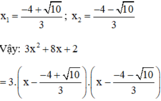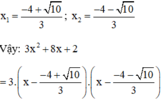1.Phân tích đa thức thành nhân tử bằng phương pháp tách,thêm hoặc bớt dạng ax2+bx+c :
a)x2-4x+2
b)x2-12x+11
c)3x2+6x-9
d)2x2-6x+2
Hãy nhập câu hỏi của bạn vào đây, nếu là tài khoản VIP, bạn sẽ được ưu tiên trả lời.

* Chứng minh:
Phương trình a x 2 + b x + c = 0 có hai nghiệm x 1 ; x 2
⇒ Theo định lý Vi-et: 
Khi đó : a.(x – x1).(x – x2)
= a.(x2 – x1.x – x2.x + x1.x2)
= a.x2 – a.x.(x1 + x2) + a.x1.x2
= 
= a . x 2 + b x + c ( đ p c m ) .
* Áp dụng:
a) 2 x 2 – 5 x + 3 = 0
Có a = 2; b = -5; c = 3
⇒ a + b + c = 2 – 5 + 3 = 0
⇒ Phương trình có hai nghiệm 
Vậy: 
b) 3 x 2 + 8 x + 2 = 0
Có a = 3; b' = 4; c = 2
⇒ Δ ’ = 4 2 – 2 . 3 = 10 > 0
⇒ Phương trình có hai nghiệm phân biệt:


3x2 + 8x + 2 = 0
Có a = 3; b' = 4; c = 2
⇒ Δ’ = 42 – 2.3 = 10 > 0
⇒ Phương trình có hai nghiệm phân biệt:


* Chứng minh:
Phương trình ax2 + bx + c = 0 có hai nghiệm x1; x2
⇒ Theo định lý Vi-et: 
Khi đó : a.(x – x1).(x – x2)
= a.(x2 – x1.x – x2.x + x1.x2)
= a.x2 – a.x.(x1 + x2) + a.x1.x2
= 
= a.x2 + bx + c (đpcm).
* Áp dụng:
a) 2x2 – 5x + 3 = 0
Có a = 2; b = -5; c = 3
⇒ a + b + c = 2 – 5 + 3 = 0
⇒ Phương trình có hai nghiệm 
Vậy: 

\(\left(x^2+4x+8\right)^2+3x\left(x^2+4x+8\right)+2x^2=\left(x^2+4x+8+\dfrac{3}{2}x\right)^2-\dfrac{1}{4}x^2=\left(x^2+\dfrac{11}{2}x+8\right)^2-\left(\dfrac{1}{2}x\right)^2=\left(x^2+\dfrac{11}{2}x+8-\dfrac{1}{2}x\right)\left(x^2+\dfrac{11}{2}x+8+\dfrac{1}{2}x\right)=\left(x^2+5x+8\right)\left(x^2+6x+8\right)=\left(x+2\right)\left(x+4\right)\left(x^2+5x+8\right)\)
\(\left(x^2+4x+8\right)^2+3x\left(x^2+4x+8\right)+2x^2\)
\(=\left(x^2+4x+8\right)^2+x\left(x^2+4x+8\right)+2x\left(x^2+4x+8\right)+2x^2\)
\(=\left(x^2+4x+8\right)\left(x^2+5x+8\right)+2x\left(x^2+5x+8\right)\)
\(=\left(x^2+5x+8\right)\left(x+2\right)\left(x+4\right)\)

a. \(=4x^3-12x^2-x^2+3x+6x-18=\left(x-3\right)\left(4x^2-x+6\right)\)
b. \(=-x^3+x^2-7x^2+7x-x+1=\left(x-1\right)\left(-x^2-7x-1\right)\)
c. \(=x^3+2x^2-6x^2-12x+4x+8=\left(x+2\right)\left(x^2-6x+4\right)\)

c) \(5x^2+3y+15x+xy=5x\left(x+3\right)+y\left(x+3\right)=\left(x+3\right)\left(5x+y\right)\)
d) \(x^2+6x+9-y^2=\left(x+3\right)^2-y^2=\left(x+3-y\right)\left(x+3+y\right)\)
e) \(x^2-y^2+2x+1=\left(x^2+2x+1\right)-y^2=\left(x+1\right)^2-y^2=\left(x+1-y\right)\left(x+1+y\right)\)
f) \(x^2-2xy-9+y^2=\left(x^2-2xy+y^2\right)-9=\left(x-y\right)^2-3^2=\left(x-y-3\right)\left(x-y+3\right)\)
c: \(5x^2+15x+3y+xy\)
\(=5x\left(x+3\right)+y\left(x+3\right)\)
\(=\left(x+3\right)\left(5x+y\right)\)
d: \(x^2+6x+9-y^2\)
\(=\left(x+3\right)^2-y^2\)
\(=\left(x+3-y\right)\left(x+3+y\right)\)
e: \(x^2+2x+1-y^2\)
\(=\left(x+1\right)^2-y^2\)
\(=\left(x+1-y\right)\left(x+1+y\right)\)
f: \(x^2-2xy+y^2-9\)
\(=\left(x-y\right)^2-9\)
\(=\left(x-y-3\right)\left(x-y+3\right)\)

1, \(xy^3-x^3y=xy\left(y^2-x^2\right)=xy\left(y-x\right)\left(x+y\right)\)
2, \(5x\left(3y+4x-6\right)\)
3, \(3x\left(2-y\right)\)
4, \(x\left(x^2+2x+1\right)=x\left(x+1\right)^2\)
5, \(x\left(4x^2-12x+9\right)=x\left(2x-3\right)^2\)
6, \(2xy\left(x+2y-5x^2y\right)\)
7, \(x^2\left(x^2+2x+1\right)=x^2\left(x+1\right)^2\)
11, \(\left(x+y\right)\left(x-1\right)\)
\(1,xy^3-x^3y=xy\left(y^2-x^2\right)=xy\left(y-x\right)\left(y+x\right)\\ 2,15xy+20x^2-30x=5x\left(3y+4x-6\right)\\ 3,6x-3xy=3x\left(2-y\right)\\ 4,x^3+2x^2+x=x\left(x^2+2x+1\right)=x\left(x+1\right)^2\\ 5,4x^3-12x^2+9x=x\left(4x^2-12x+9\right)=x\left(2x-3\right)^2\\ 6,2x^2y+4xy^2-10x^3y^2=2xy\left(x+2y-5x^2y\right)\\ 11,x\left(x-1\right)-y\left(1-x\right)=x\left(x-1\right)+y\left(x-1\right)=\left(x-1\right)\left(x+y\right)\)
a) x2 - 4x + 2 = (x2 - 4x + 4) - 2 = (x - 2)2 - 2 = \(\left(x-2+\sqrt{2}\right)\left(x-2-\sqrt{2}\right)\)
b) x2 - 12x + 11 = x2 - x - 11x + 11 = x(x - 1) - 11(x - 1) = (x - 1)(x - 11)
c) 3x2 + 6x - 9 = 3x2 - 3x + 9x - 9 = 3x(x - 1) + 9(x - 1) = (3x + 9)(x - 1) = 3(x + 3)(x - 1)
d) 2x2 - 6x + 2 = 2(x2 - 3x + 1) = 2(x2 - 3x + 9/4 - 5/4) = 2[(x - 3/2)2 - 5/4] = \(2\left(x-\frac{3}{2}+\sqrt{\frac{5}{4}}\right)\left(x-\frac{3}{2}-\sqrt{\frac{5}{4}}\right)\)
1.
a) \(x^2-4x+2=\left(x^2-4x+4\right)-2=\left(x-2\right)^2-2=\left(x-2-\sqrt{2}\right)\left(x-2+\sqrt{2}\right)\)
b) \(x^2-12x+11=\left(x^2-12x+36\right)-25=\left(x-6\right)^2-5^2=\left(x-6-5\right)\left(x-6+5\right)=\left(x-11\right)\left(x-1\right)\)
c) \(3x^2+6x-9=3\left(x^2+2x-3\right)=3\left[\left(x^2+2x+1\right)-4\right]=3\left[\left(x+1\right)^2-2^2\right]=3\left(x-1\right)\left(x+3\right)\)
d) \(2x^2-6x+2=2\left(x^2-3x+1\right)=2\left(x^2-2.x.\frac{3}{2}+\frac{9}{4}-\frac{5}{4}\right)=2\left[\left(x-\frac{3}{2}\right)^2-\frac{5}{4}\right]\)
\(=2\left(x-\frac{3}{2}-\frac{\sqrt{5}}{2}\right)\left(x-\frac{3}{2}+\frac{\sqrt{5}}{2}\right)\)